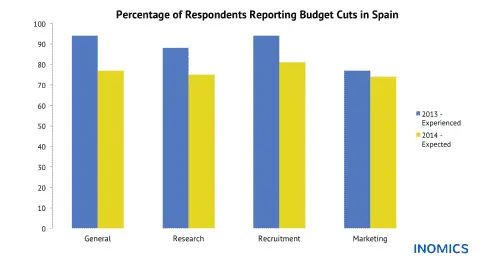The following article is archived and is no longer considered up-to-date. Please interpret its content in the context of the publishing date.

ARCHIVED
Budget Cuts in Spain: Experienced and Expected Changes in Academic Institutions
Read a summary using the INOMICS AI tool
Last year, we conducted a global survey of nearly 800 academics, asking questions about budget cuts at their respective institutions for fiscal year 2013, and their expectations for 2014. We wanted to get a sense of the climate around the world in terms of who is still being affected by the economic downturn, and to what extent, in order to better grasp the daily reality for both employers and job seekers.
This post will be the first in a series examining the responses we received from professionals in various countries. Of those who responded to our survey from Spain, 89% indicated that they work for a university, 6% for a private company, 3% for a bank, and 3% for the government.
The responses from Spain resonated with a reality with which we’ve become familiar – not only was it one of the hardest hit countries in Europe (94% of respondents reported cuts to their general budgets for 2013), but the prospects for speedy recovery are also minimal (77% of respondents forecasted general budget cuts for fiscal year 2014).
These numbers do reflect a shift in a positive direction, however, as the percentage of people who claim to have budgets that were “not affected” in 2013 (6%) grew larger for 2014 (17%). Looking at the graph above, you can see that responses for recruitment, marketing and research budgets follow a similar trajectory.
As you can see, marketing budgets were reported to have had the fewest cuts in 2013 and maintained this position for 2014. These data were consistent across nearly all countries that took part in the survey, which is good news for marketing departments from across the education industry.
-
- PhD Program, Program, Postgraduate Scholarship
- Posted 1 week ago
PhD Program in Economics - 6 Fully Funded Scholarships
at Luiss Guido Carli University of Rome in Rome, Italie
-
- Conférence
- Posted 4 weeks ago
Industrial Policies in a Globalized and Financialized World
Between 7 May and 8 May -
- PhD Candidate Job
- Posted 2 weeks ago
3 PhD positions at the Vienna Graduate School of Economics (VGSE)
At Vienna Graduate School of Economics - VGSE in Vienna, Autriche













